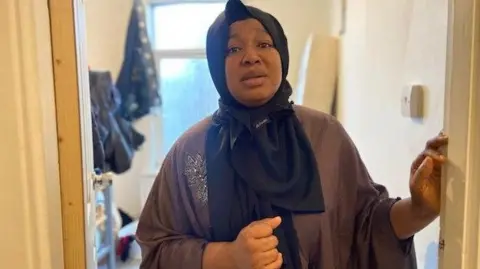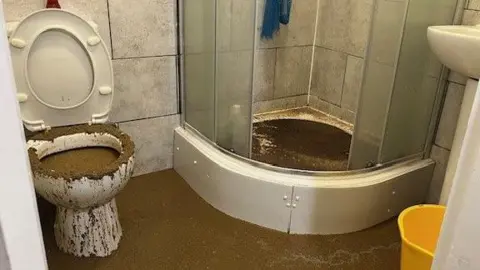Families live in ‘terrible’ temporary accommodation with sewage spills and vermin

 BBC
BBCWhen you step inside Fauzia’s house, the smell immediately hits you. It is a mixture of raw sewage and pesticides.
“I have to spray this house every morning,” says Fauzia, who has been living with her family in a street of terraced houses in west London for eight months.
She holds a box of insect repellent in one hand and covers her nose with the other.
“I spray it before my kids come down to breakfast. That’s how I live.”
The white walls are full of black flies – but the biggest problem is a shower room next to the kitchen.
Excrement flows from the toilet bowl onto the floor and fills the shower cubicle.

If someone runs a kitchen tap, sewage bubbles up. There are bugs in the kitchen and mold and dampness throughout the house, including the children’s bedrooms. The windows are full of trash because they don’t close properly.
Enfield Council pays a private landlord £2,543 a month to rent the property to Fauzia’s family, who were evicted when their previous home was put up for sale.
They are one of a record 123,000 families living in temporary accommodation in England, including 160,000 children.
Councils spent £1bn last year tackling the issue, a 50% increase over 2022 as numbers rise.
A major reason for rising homelessness is that both rent and property prices have been rising faster than wages for many years. At the same time, no-fault evictions – in which a landlord can evict tenants without giving a reason – were reintroduced after the coronavirus pandemic.
This government has promised to eventually ban these types of evictions, a move that is expected to become law by the summer of 2025.
On Wednesday, the government announced how it will allocate the £1bn budgeted to tackle the housing crisis, which it calls “the worst in living memory”.
While around £200 million will be spent on tackling rough sleeping and investing in drug and alcohol services for homeless people, the bulk of the money, £633 million, will be spent on preventing homelessness and paying for temporary accommodation.
The challenge is highlighted in Freedom of Information (FOI) data shared exclusively with the BBC by housing charity Shelter, which shows that a record one in every 84 primary school children in England will be homeless this Christmas.
In London this number has risen to one in 24 – the equivalent of one child in every classroom.
“It’s having an absolutely devastating impact on their health, their mental health and their education,” says Mary McRae, head of policy at Shelter.
The demand for temporary accommodation is so high that councils often have no choice but to house families miles apart, which has a huge impact on children.
When Fauzia’s family was declared homeless, they were moved to Enfield, north London, two hours away from their schools and workplaces.
Fauzia’s children, nine-year-old Ismail and 12-year-old Mateen, often come late for school.
“I hid the situation until one day the school wrote me a letter saying we had to pay a £200 (late) fine and I went to reception and cried,” says Fauzia.
Some days she parks near the school and waits in her car for up to six hours until it’s time to pick up the kids.
‘Remembering childhood’
This distance also creates problems for Fauzia’s husband. Mohammed is a delivery driver for a popular donut chain and now wakes up at midnight to start his shift at 3 am.
Fauzia wakes up at 4:30 in the morning and starts spraying insecticide in the house. Then the children get up around 6 in the morning and get ready to go to school in the dark.
Fauzia is a trained hairdresser, but cannot work due to her heavy commute.
She’s also worried about the impact on her sons.
“I’m very worried that they’re losing their childhood.”
Fauzia says she has repeatedly informed the council and agents about the problems with her temporary accommodation.
Enfield Council said it was made aware of the issues at Fauzia’s home in October and was told by the estate agent that these had been rectified.
As soon as the BBC got involved, the family was resettled within 48 hours. They are now living in temporary accommodation in Barking and Dagenham, about a 50-minute drive from her children’s school.
The council said it would take formal enforcement action if letting agents or landlords were found guilty.
Enfield Council said it “does not condone the poor condition of this property” and apologized for the “poor quality of support” Fawzia and her family received.
‘Horrible’ photos
A spokesman for management agents LTA Direct admitted that photographs of the property sent to them by the BBC were “appalling”.
Agents claim that when they inspected the property on December 2, there were no drainage problems, and mold and damp remediation was scheduled to take place this week.
But when the BBC first visited Fauzia’s home in Ealing on November 28, the sewage problem was clearly visible.
The agency says the leaking sewage is a structural issue and has told the landlord the property needs a complete renovation to make it habitable again.
The landlord told us that he was “completely unaware” that the property had fallen into this condition and that the management of the property would have been outsourced to the letting agents he employed, as he had never heard of LTA Direct.
Fauzia is keen to move her family back to Enfield and has been bidding for the council property since 2012. Although he has found relief in staying away from mold, flies and sewage, his problems are not over yet.
“It’s 10,000 times better than the old house,” she says, “but it’s still temporary.”






